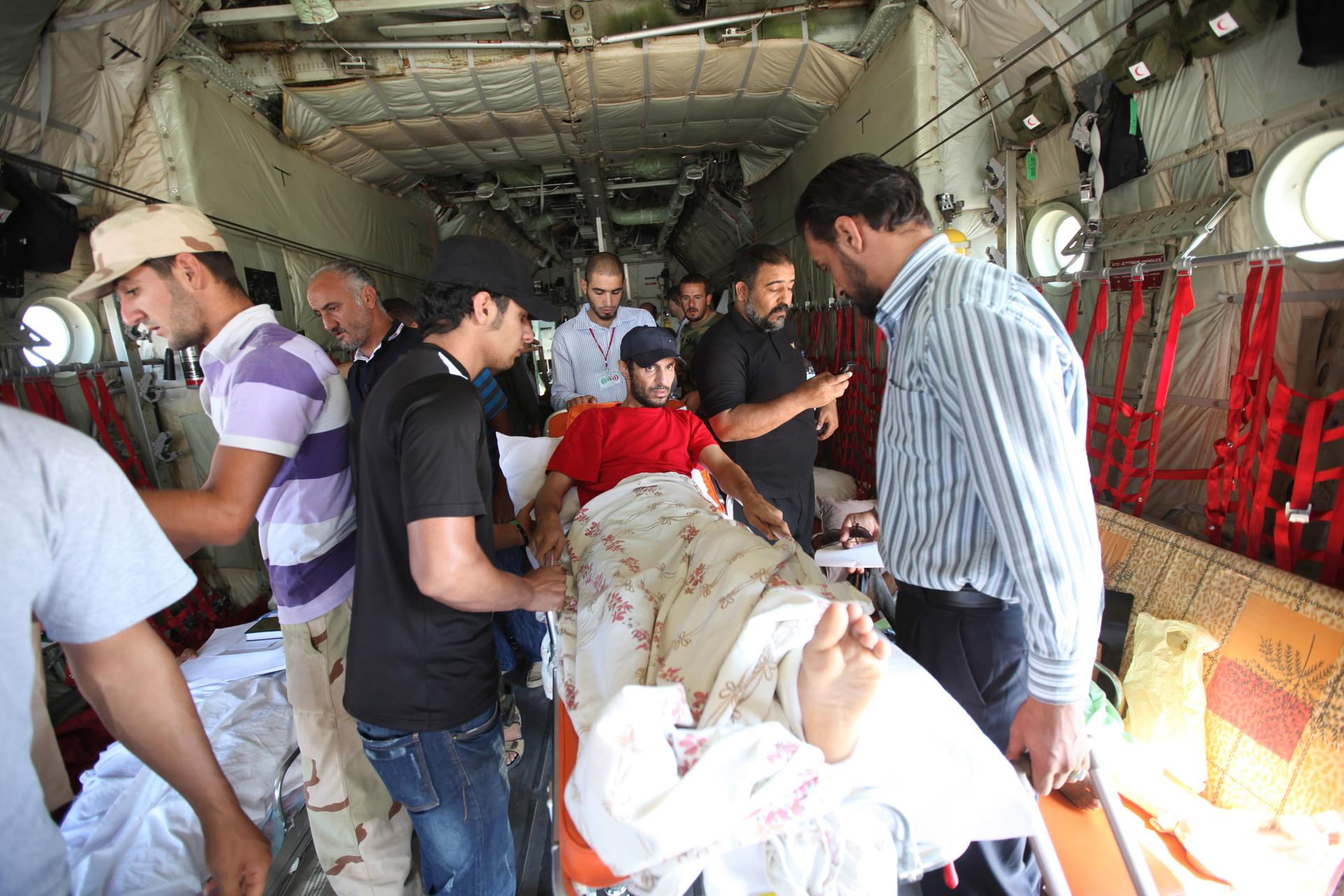Libya’s revolutionary fighters turn to Jordan for medical treatment
A wounded Libyan National Transitional Council fighter boards a Libyan Air Force plane in Tripoli heading to Jordan for further medical treatment, Oct. 1, 2011. (Photo by Ismail Zitouny/Reuters.)
Wahnis Mohamed is recuperating from surgery and doing well.
Wahnis, who’s 45, came to Jordan Hospital in Amman to donate a kidney to his sister. She’s doing fine too, he said.
“This operation would not have been possible back in Libya before the revolution,” Mohamed said. “We didn’t have the connections.”
He added that this is his first time in Jordan, which is doing a “great job” helping patients from Libya.
Jordan doesn’t share a border with the North African state of Libya. Far from it; Amman and Tripoli are more than 1,300 miles apart. But Jordan is playing a role in Libya’s effort to recover from months of civil war and the decades of brutal dictatorship under the Muammar Gaddafi. Tens of thousands of Libyans have traveled to Jordan in the past year for medical treatment.
They started to arrive last summer, when Jordan flew in 170 injured Libyan fighters and treated them for free. The numbers grew quickly — and they weren’t just injured warriors. Libyans seeking treatment for cancer, diabetes and even in-vitro fertilization started coming to Jordan, which is considered to have some of the best hospitals in the Arab world.
By the end of the year, Jordan was getting up to 800 patients from Libya per day.
“All the time, I am talking about it as a tsunami for Jordan,” said Dr. Awni al-Bashir, chairman of the Private Hospitals Association in Jordan. He said more than 50,000 Libyan patients have come to Jordan in the past six months.
“It was for us miserable days, but we managed not to be broken under this stress of this number of patients.”
One detail that had to be smoothed out was the skyrocketing medical tab for all these patients. The new Libyan government has pledged to foot much of the bill; it is estimated to be in the tens of millions of dollars. The hospitals in Jordan might stand to make a lot of money – eventually — but for now, Jordanian patients are complaining that their hospitals are more crowded than ever.
That sentiment was expressed in a recent political cartoon. It shows a Jordanian man squeezing into a hospital bed already occupied by a Libyan man. The Jordanian is saying sarcastically, “No, you’re not bothering me at all. I hope you feel better!”
Jordanians shouldn’t worry about Libyan patients getting priority, said Dr. Abdullah Bashir, chief of Jordan Hospital.
“All of them will be treated. The Jordanians and the Libyans will be treated by either by Jordan private hospitals, or private sector, or the government.”
Bashir added that it’s not a competition. “All of us are working to serve them all, Libyans and the Jordanians.”
He added that medical professionals in Jordan should be proud of what they’re doing to help Libyan patients in the wake of the overthrow of Colonel Gaddafi.
“One man was ruling the country and taking all the resources of the country without giving to any sector, especially the medical sector,” he said. “It’s a rich country. The medical sector should be very good.”
He said Libyans should be able to treat patients from outside Libya, and not be forced to seek treatment abroad.
While Libyan patients say they’re happy to get the treatment here in Jordan, some expressed frustration.
A young man from Tripoli – whose right arm was shot up during the fighting last year – said he and his comrades were flown to Jordan at the expense of Libya’s transitional government.
“People here treat us like donkeys,” he said. “They don’t understand what we’ve been through.”
But if Libyans here are feeling frustrated, Abdo-Salaam Kuriayeb, the Libyan official in charge of moving patients in and out of Jordan, reminds them to be on their best behavior.
Every Libyan who comes here, he said, needs to respect the people of Jordan and be appreciative.
Our coverage reaches millions each week, but only a small fraction of listeners contribute to sustain our program. We still need 224 more people to donate $100 or $10/monthly to unlock our $67,000 match. Will you help us get there today?
